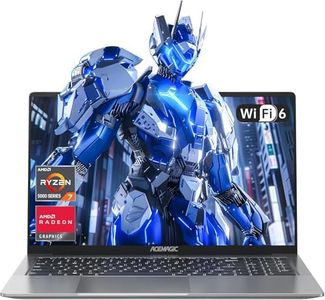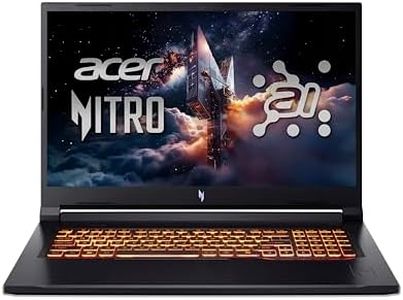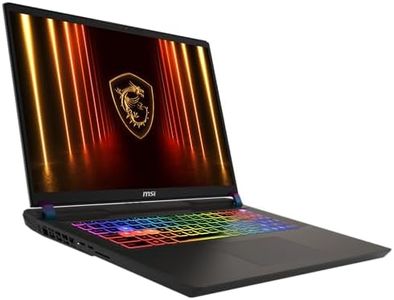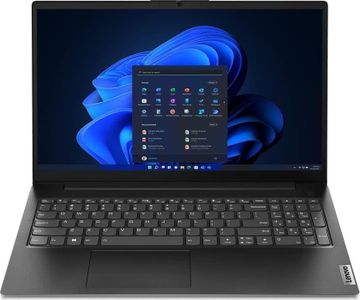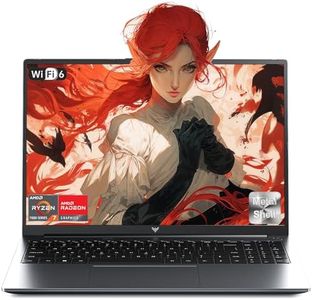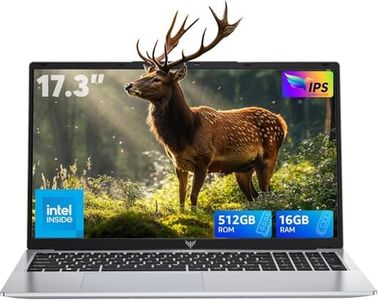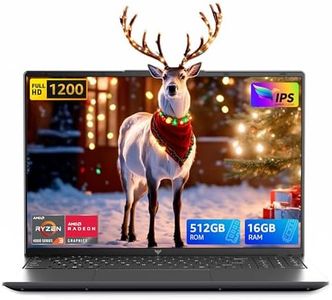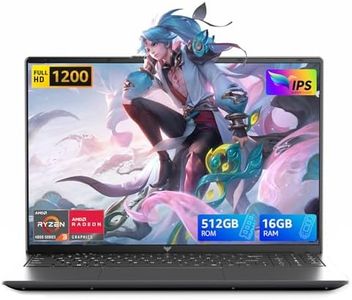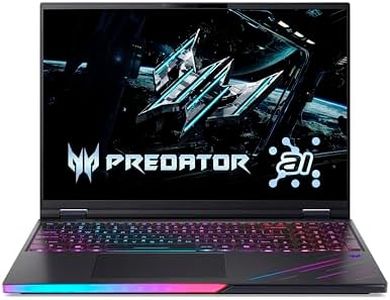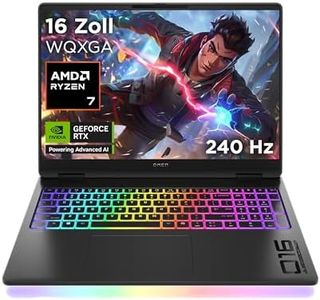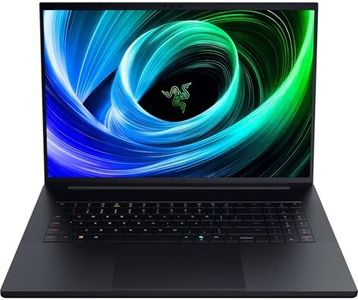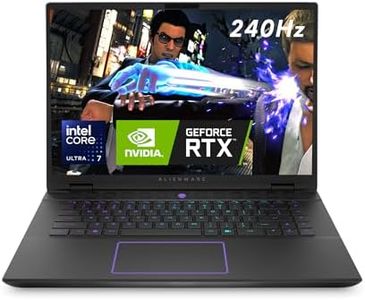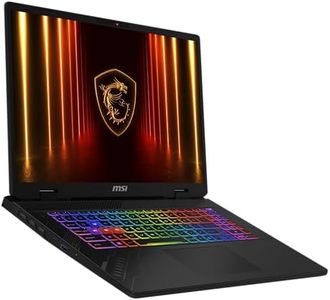10 Beste Gaming Laptops
Von führenden Marken und Bestsellern, die im Internet erhältlich sind.Unsere Top-Auswahl
Gewinner
Lenovo Legion 5i Gaming AI Laptop | 15.1" WQXGA 165Hz OLED Display | NVIDIA GeForce RTX 5070 | Intel Core i7-13650HX | 32GB RAM | 1TB SSD | Win11 | QWERTZ | Eclipse Black | 3 Monate GamePass
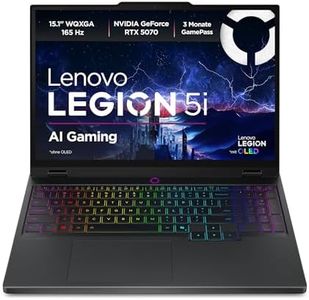 Lenovo
LenovoDas Lenovo Legion 5i 15IRX10 ist ein starker Gaming-Laptop, der besonders für Spieler geeignet ist, die hohe Leistung und ein beeindruckendes Bild wollen. Mit dem Intel Core i7 Prozessor und der NVIDIA GeForce RTX 5070 Grafikkarte bietet er genug Power, um aktuelle Spiele flüssig darzustellen. Das 15,1 Zoll große OLED-Display mit einer Auflösung von 2560 x 1600 Pixeln und einer Bildwiederholrate von 165 Hz sorgt für besonders scharfe und lebendige Bilder sowie eine flüssige Darstellung, was gerade bei schnellen Spielen von Vorteil ist. Der große Arbeitsspeicher von 32 GB DDR5-RAM ermöglicht flüssiges Multitasking und schnelle Reaktionen im Spiel. Mit der 1 TB schnellen SSD ist ausreichend Speicherplatz vorhanden, um viele Spiele und Programme zu speichern, und die Ladezeiten bleiben kurz.
Die Akkulaufzeit ist mit 60 Wattstunden zwar solide, aber bei intensiven Gaming-Sessions sollte man eher am Netzteil bleiben. Mit einem Gewicht von 3,26 kg ist der Laptop nicht der leichteste, bietet dafür aber eine gute Kühlung bei leiser Lüftersteuerung. Für Gamer, die einen leistungsstarken und gut ausgestatteten Laptop für Zuhause oder den gelegentlichen Transport suchen, ist das Legion 5i eine sehr gute Wahl. Wer viel unterwegs ist oder ein besonders leichtes Gerät bevorzugt, könnte das Gewicht als Nachteil empfinden. Das Gerät überzeugt mit starker Hardware, einem brillanten Display und nützlichen Gaming-Extras wie dem 3-monatigen Xbox Game Pass.
acer Nitro V 17 AI (ANV17-41-R27N) Gaming Laptop, 17" WQHD IPS 165Hz Display, AMD Ryzen 7 260, 32 GB RAM, 1 TB SSD, NVIDIA GeForce RTX 5060, Windows 11, QWERTZ Tastatur, Black
Das Acer Nitro V 17 AI ist ein leistungsstarker Gaming-Laptop, der besonders durch seinen großen 17,3 Zoll WQHD-Bildschirm mit 165 Hz auffällt. Das sorgt für scharfe und flüssige Darstellung, was beim Spielen vor allem bei schnellen Spielen einen Vorteil bietet. Ausgestattet mit dem AMD Ryzen 7 260 Prozessor und der modernen NVIDIA GeForce RTX 5060 Grafikkarte bietet der Laptop genug Power für anspruchsvolle Spiele und kreative Anwendungen. Die 32 GB DDR5-RAM sorgen für eine sehr schnelle und reibungslose Leistung, auch wenn viele Programme gleichzeitig laufen. Der 1 TB SSD-Speicher ist schnell und bietet viel Platz für Spiele und Dateien, was HDDs oft nicht schaffen.
Die Akkulaufzeit liegt bei bis zu 10,5 Stunden, was für ein Gaming-Gerät sehr ordentlich ist und mobilen Einsatz ermöglicht. Trotz des großen Displays wiegt das Notebook mit 2,71 kg noch relativ wenig und ist vergleichsweise flach, was den Transport erleichtert. Die Anschlussvielfalt mit USB-C, HDMI und weiteren Ports ist praktisch für verschiedene Peripheriegeräte.
Als kleiner Nachteil kann man das Gewicht im Vergleich zu kleineren 15-Zoll-Laptops nennen, es ist also nicht das leichteste Modell, wenn Mobilität oberste Priorität hat. Wer einen großen, schnellen und gut ausgestatteten Gaming-Laptop sucht, der auch unterwegs einsatzbereit ist, findet hier ein sehr gutes Gerät. Für Nutzer, die vor allem sehr leichtes oder extrem kompaktes Design wünschen, könnte es allerdings etwas groß und schwer sein.
acer Nitro V 17 AI (ANV17-41-R57S) Gaming Laptop, 17" WQHD IPS 165Hz Display, AMD Ryzen 7 260, 32 GB RAM, 1 TB SSD, NVIDIA GeForce RTX 5070, Windows 11, QWERTZ Tastatur, Black
Das Acer Nitro V 17 AI (ANV17-41-R57S) ist ein leistungsstarker Gaming-Laptop mit einem großen 17,3-Zoll-WQHD-Display (2560 x 1440 Pixel) und einer schnellen 165 Hz Bildwiederholrate. Das sorgt für scharfe, flüssige Bilder, ideal für Gaming und Medien. Angetrieben wird das Gerät vom AMD Ryzen 7 260 Prozessor mit bis zu 5,1 GHz und der modernen NVIDIA GeForce RTX 5070 Grafikkarte mit 8 GB GDDR7 VRAM. Diese Kombination bietet viel Leistung für aktuelle Spiele, auch in höheren Einstellungen. Mit 32 GB DDR5 RAM ist der Laptop auch für anspruchsvolle Aufgaben und Multitasking gut gerüstet. Der schnelle 1 TB PCIe Gen4 SSD Speicher sorgt für kurze Ladezeiten und ausreichend Platz. Die Akkulaufzeit von bis zu 10,5 Stunden ist für einen Gaming-Laptop ordentlich, sodass man auch unterwegs einige Zeit ohne Steckdose arbeiten oder spielen kann.
Allerdings bringt das Gerät mit 4,07 kg und einer Bautiefe von über 7 cm etwas Gewicht und Größe mit, was die Mobilität einschränken kann, besonders im Vergleich zu leichteren Modellen. Die Tastatur ist beleuchtet und bietet ein Nummernfeld, was gerade bei längeren Sessions hilfreich ist. Die Anschlussvielfalt mit USB-C, HDMI, DisplayPort und Killer LAN ist für Gamer und Kreative gut ausgestattet. Das Acer Nitro V 17 AI eignet sich besonders für Nutzer, die ein großes, scharfes Display und starke Hardware für Gaming oder kreative Arbeiten wünschen und dabei nicht extrem auf das Gewicht achten müssen.
Top-Auswahl vergleichen
Lenovo Legion 5i Gaming AI Laptop | 15.1" WQXGA 165Hz OLED Display | NVIDIA GeForce RTX 5070 | Intel Core i7-13650HX | 32GB RAM | 1TB SSD | Win11 | QWERTZ | Eclipse Black | 3 Monate GamePass Auf Amazon ansehen | acer Nitro V 17 AI (ANV17-41-R27N) Gaming Laptop, 17" WQHD IPS 165Hz Display, AMD Ryzen 7 260, 32 GB RAM, 1 TB SSD, NVIDIA GeForce RTX 5060, Windows 11, QWERTZ Tastatur, Black Auf Amazon ansehen | acer Nitro V 17 AI (ANV17-41-R57S) Gaming Laptop, 17" WQHD IPS 165Hz Display, AMD Ryzen 7 260, 32 GB RAM, 1 TB SSD, NVIDIA GeForce RTX 5070, Windows 11, QWERTZ Tastatur, Black Auf Amazon ansehen |
|---|---|---|
| Angebot | ||
| - | - | - |
| Ausgewählt von | ||
| 1.332 | 1.230 | 1.128 |
| Mehrere Stile verfügbar | ||
| Processor (CPU) | ||
| Intel Core i7, 2.7 GHz, 14 cores | AMD Ryzen 7 260, 3.8 GHz, 8 cores | AMD Ryzen 7 260, bis 5,1 GHz |
| Graphics Card (GPU) | ||
| NVIDIA RTX 5070, Dediziert, GDDR6 | NVIDIA GeForce RTX 5060, 8 GB GDDR7 | NVIDIA GeForce RTX 5070, 8 GB |
| Display (Screen Size & Refresh Rate) | ||
| 15,1 Zoll OLED, 2560x1600, 165 Hz | 17.3 Zoll, 2560x1440, 165 Hz | 17,3 Zoll, 2560x1440, 165 Hz |
| Memory (RAM) | ||
| 32 GB DDR5 | 32 GB DDR5 | 32 GB DDR5 |
| Storage (SSD vs. HDD, Capacity) | ||
| SSD 1 TB | 1 TB SSD | 1 TB PCIe Gen4 SSD |
| Battery Life | ||
| 60 Wattstunden | 10.5 Stunden | 10,5 Stunden |
| Portability (Size & Weight) | ||
| 344,9x255,35x0,1 cm; 3,26 kg | 53x31.5x6.8 cm; 2.71 kg | 4,07 kg, Tiefe über 7 cm |
